How to make fence posts on farms last longer
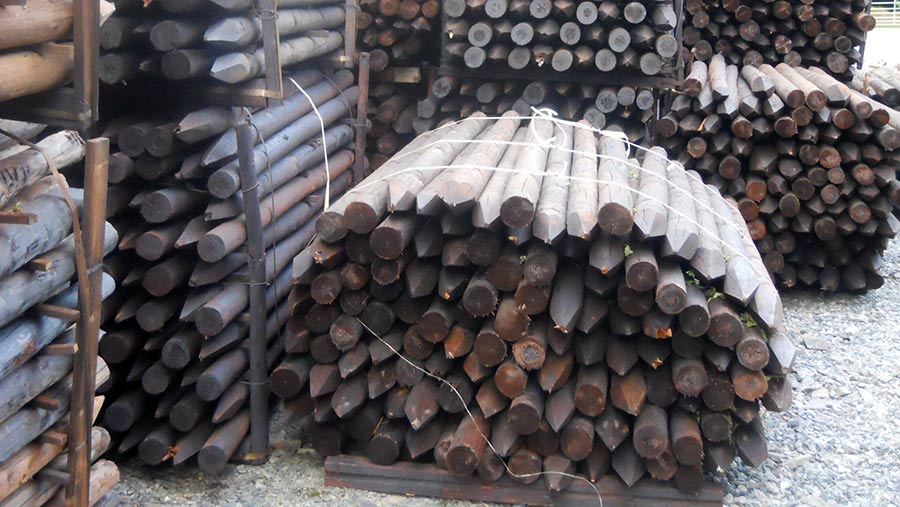 © Fence and Forget
© Fence and Forget Preservative-treated timber fence posts have developed a pretty dire reputation over the past decade or so.
Countless farmers have shelled out thousands for these products, gone to the expense of putting them into a fence and then found, five years down the line, that they’ve rotted off at ground level.
As a result, many have lost faith in posts treated with modern preservatives, turning back to time-proven, pressure-treated creosote, or adopting metal or recycled plastic versions.
See also: How to build the perfect livestock fence
Some manufacturers have been working hard to shake this reputation, though.
They reckon they’ve cracked the problem, with timber and treatments that will stand the test of time, plus they’re willing to issue guarantees to back them up.
Below, we’ve picked out a couple of options that promise a longer lifespan and priced them up against creosote, metal and plastic alternatives.
All of the products featured are protected by manufacturer warranties of at least 15 years and, with some guaranteeing 30 years or more of service life, buyers better find a safe place to stash their receipt.
Wood
Preservative-treated timber
There is a broad range of preservative-treated timber on sale in the UK but, regardless of the process they’ve gone through, they often get referred to as tanalised.
This is actually a brand name for wood treated with one of the more popular products, Tanalith E, so it’s a bit like calling your grainstore vacuum a Hoover.
Up until 2006, copper chrome arsenate (CCA) was one of the most common treatments and this did a decent job of keeping the rot at bay.
However, concerns over its safety meant it was removed from the market and it was replaced by a different set of formulations.
Problems soon started to creep in, as these were less effective and some of the methods used to apply them weren’t rigorous enough to provide adequate protection.
This, combined with fast-grown timber, meant some posts started to fail in less than five years.
The industry is working to address these concerns with new treatments containing copper and organic biocides that protect the wood without making it hazardous.
Common brands are Tanalith E mentioned above, Celcure AC and Wolmanit CX.
These are being combined with the use of better-quality base timber, kiln drying and modern pressure treatment, which all help to extend the lifespan.
A technique called incising has also come in, which puts a series of deep knife cuts into the timber to help the preservative penetrate deep into the sap wood.
This is particularly important in spruce posts, as the cell structure of the sap wood doesn’t readily allow the preservative to soak in.
Treated timbers have a classification system, with UC1 being the least resistant to decay and UC4 giving the top level of protection.
However, there’s still variation between timbers that meet the UC4 standard.
Jacksons
Jacksons Fencing has one of the longest guarantees for preservative-treated timber and its Jackcure posts come with a 25-year warranty against rot and insect attack.
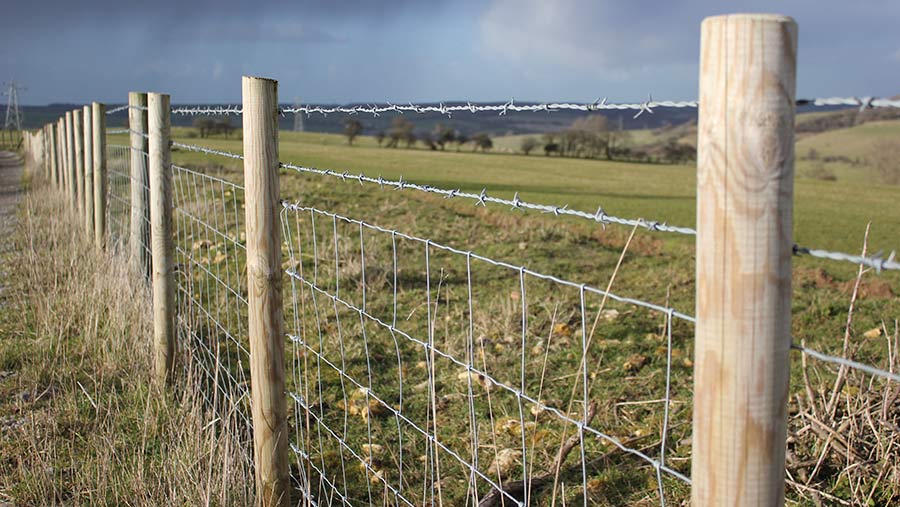
© Jacksons
Only pine is used to make these posts, and this is kiln dried to less than 28% moisture so that the timber more readily absorbs the preservative.
The treatment process involves putting the timber into a pressure vessel before creating a vacuum, flooding it with preservative and then pressurising it to at least 12.4bar.
Customers register for the 25-year guarantee online when they purchase the posts and this is stored in Jackson’s records.
However, if they forget to do this, they can use their order number or receipt to make a claim.
The only stipulation is that cut timbers are given the firm’s end-grain treatment to prevent rot and insect attack.
Guideline prices
- 75×1,650mm post: £3.15
- 90×1,650mm post: £5,25
- 150×2,100mm strainer post: £27.50
- 150×2,400mm strainer post: £32.25
- Guarantee: 25 years – buyers register online or claim by presenting an order number or receipt.
M&M Timber
M&M Timber is based in Worcestershire and it has adopted the incising method to help improve the penetration of treatment into the sapwood.
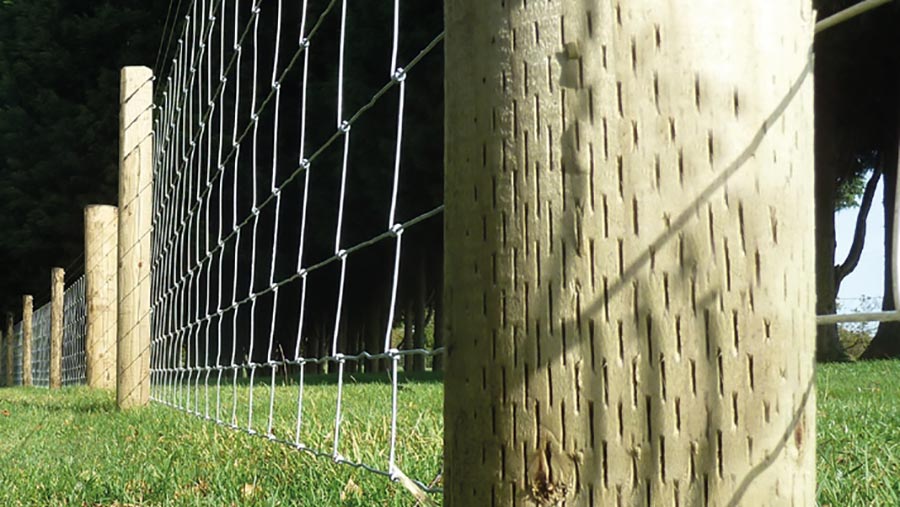
© M&M Timber
Its Agricised posts are made from spruce timber and they pass through the incising machine, receiving a series of uniform, 6mm-deep cuts along one-third of their length.
This covers the area at ground level, which is most vulnerable to decay.
The posts are then kiln dried to 40% before being pressure treated with Tanalith E preservative.
Each post has a corrosion-resistant metal ID tag and M&M issues it with a “quibble free” 15-year anti-rot guarantee.
The posts are sold by a number of retailers, including Mole Valley Farmers, which brands them as the Shield range.
Guideline prices
- 85×1,650mm: from £2.99 each
- 150×2,400mm: from £16.49 each
- Guarantee: 15 years – buyers register for this online
*Prices from Mole Valley Farmers
Creosote
Coal-tar creosote is widely regarded as the premium method of preserving timber fence posts and there are many examples still going strong after decades of being in the ground.
This is also the product used to preserve telegraph poles, which generally have a 50-year service life, before they’re recycled to make pole barns and gate posts.
But not all creosote posts are created equal. First, they need to be cut from quality timber, such as slow-grown pine, which is strong and absorbs the treatment more readily than spruce.
The type of creosote used and the process in which it is applied to the posts also makes a difference.
Pressure treating with coal-tar creosote tends to give the best results as the product is forced deep into the timber using heat and pressure.
Some creosote posts are just dipped or soaked in creosote oil, and some are treated with different chemical forms of creosote.
The downside with creosote is that it’s unpleasant stuff, which needs to be handled with respect and shouldn’t be used in certain situations.
Fence and Forget
Mark Randall has been selling creosote fence posts from his farm near Aberystwyth under the Fence and Forget brand for more than 15 years.
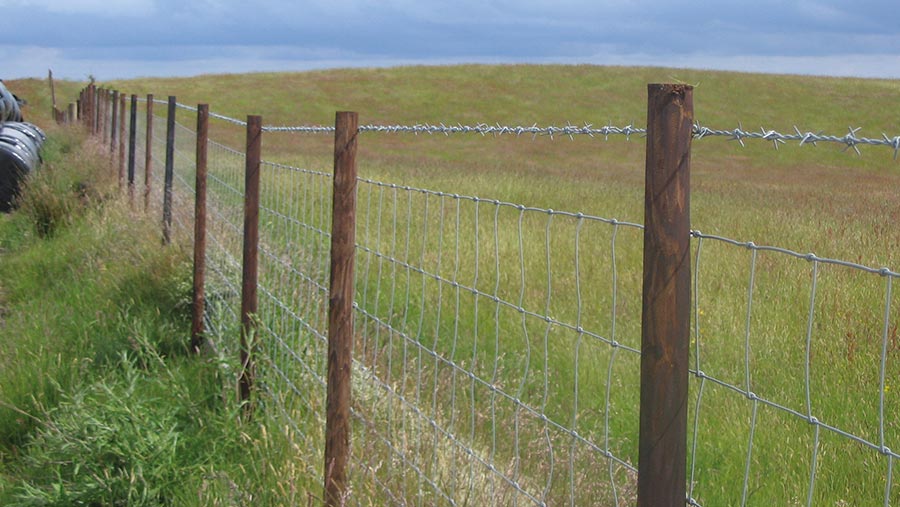
© Fence and Forget
His posts are manufactured from Scandinavian pine and are vacuum pressure treated with coal-tar creosote in south Wales.
The plant that treats the posts also treats utility poles.
According to Mr Randall, the treatment process gives the timber an expected lifespan of at least 40 years, even when in contact with the ground.
So far, he says he’s had no reports of them failing prematurely.
Guideline prices
- 80×1,600mm (4inx5ft6in) machined: £3.50 each
- 75-100×1,600mm peeled (3-4inx5ft 6in): £4 each
- 130-150×2,100mm (5-6inx7ft) strainer post: £17 each
- Guarantee: 40 years, claimed by contacting the firm and sending rotten posts for analysis.
Octopost
Creosote Octopost fencing posts are manufactured from redwood timber grown in Sweden near the Arctic circle, which the firm says gives added strength due to its slow rate of growth.
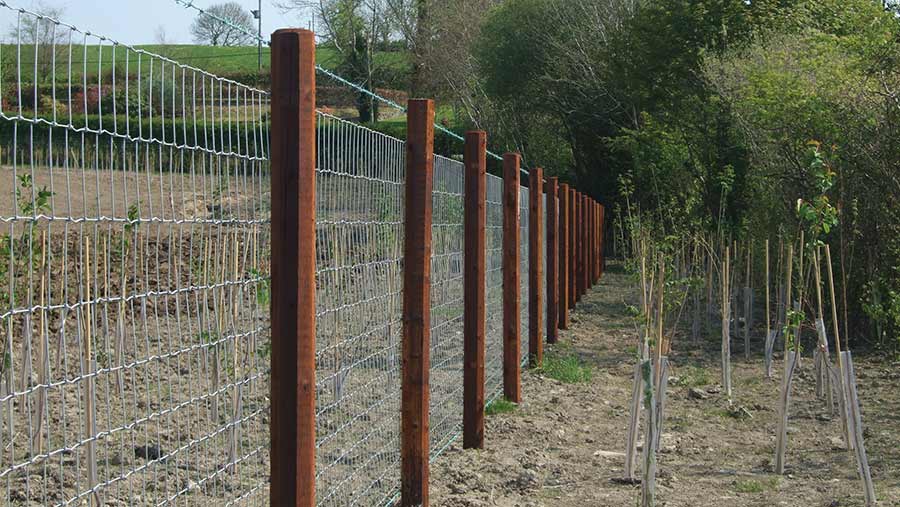
© Octopost
Once harvested and sawn, the posts are kiln dried and pressure treated with creosote to resist decay.
Octopost offers a 25-year guarantee, but the life expectancy is 30-40 years.
Octoposts are produced in Kälarne, Sweden, and they are cut into their trademark octagonal profile primarily to make them easier to ship around the world.
However, the flat surfaces do make it easier to attach rails and wire.
They are imported into southern UK by Davies Implements, which is based near Carmarthen, Wales, and JF Supplies covers Scotland and the North. There are a number of other resellers, too.
Guideline prices
- 80×1,600mm post: £3.82
- 100×1,800mm post: £6.23
- 140×2,100mm strainer post: £17.61
- Guarantee: 25 years, claimed by presenting the firm with an invoice and sending the post for analysis.
*Current prices could be affected by Brexit
Metal
Steel certainly isn’t impervious to corrosion, but when galvanised it can last for several decades, even when buried in the ground or placed underwater.
As a result, a few firms have used the material to make fencing systems, each with its own methods of attaching the wire and supporting strainers.
Unlike timber, or indeed plastic, it can’t be cut or screwed into, but the manufacturers have come up with a range of different components to try to make the product as versatile as possible.
Hampton Versalok
Hampton Steel has developed a range of high-yield steel fence posts that are made in the UK and treated with a magnesium, aluminium and zinc coating to keep corrosion at bay.

© Hampton Versalok
The posts are hollow, with 1.5mm or 2.5mm walls, both of which are formed in a delta profile to give them additional strength.
The point is also designed to splay as it is driven into the ground, which the firm says helps it anchor firmly.
Wire is attached via a series of clips that slot into holes drilled along the entire length of the post.
This means they can accommodate all brands of woven netting, regardless of the spacing.
Metal box strainers and angle strainer systems are also available.
Guideline prices
- 1.8m post with 1.5mm wall: From £4.09 each
- Wire clips: From £180 for 1,000
- 2.5m angle end strainer: From £68.95
- Guarantee: 30 years, subject to registration at the time of purchase
McVeigh Parker Clipex
McVeigh Parker’s Clipex fence posts are made from high-tensile galvanised steel and come with a series of clips for attaching wire.
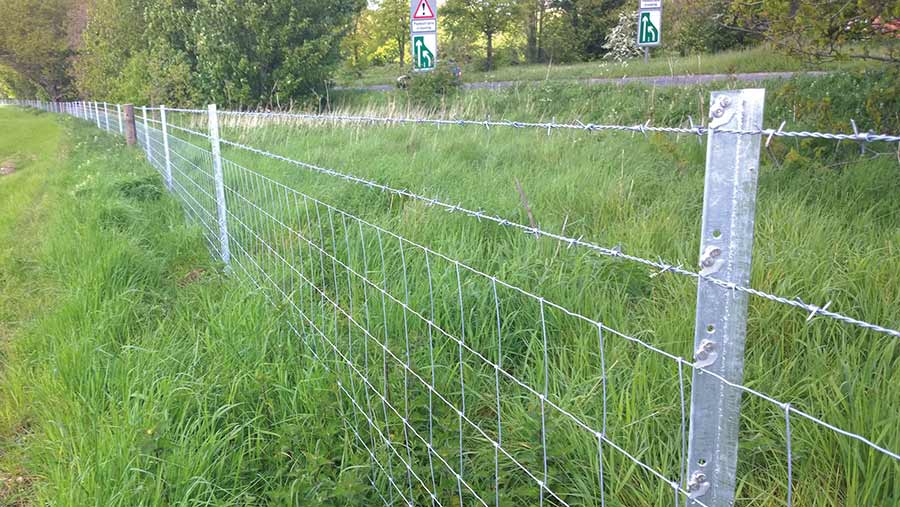
© McVeigh Parker
There is a standard-grade stock post to suit most people’s needs, but buyers are able to opt for a cheaper and lighter-weight Eco model or a heavier-duty Beefy version.
The firm has its own brand of netting, but it is possible to use other makes, providing it has the same strand spacing.
Strainers are also available in various formats, including angle-strut and box-strut.
Guideline prices
- Standard 1.8m post: £6.62 each
- Eco 1.8m post: £5.47 each
- 2.4m end strainer kit: £77.04 each
- Guarantee: 30 years, subject to registration at the time of purchase
Recycled plastic
Recycled plastic fencing doesn’t absorb water, it isn’t going to be attacked by insects and it probably won’t rot down for hundreds of years.
It can be cut, nailed and screwed into, making it a closer alternative to timber than galvanised metal.
However, it does behave differently to timber and installers need to be aware of this.
For example, the material can expand in hot weather, meaning rails need to be nailed on with expansion gaps.
It’s possible for posts under extreme tension to bend in the hot sun.
This means steel reinforced versions should be used for some strainer posts or where there’s a marked change in direction.
Hahn Plastics Hanit
Hahn Plastics has been manufacturing recycled plastic products since 1993 and its fence posts are made from a blend of HDPE and polypropylene.
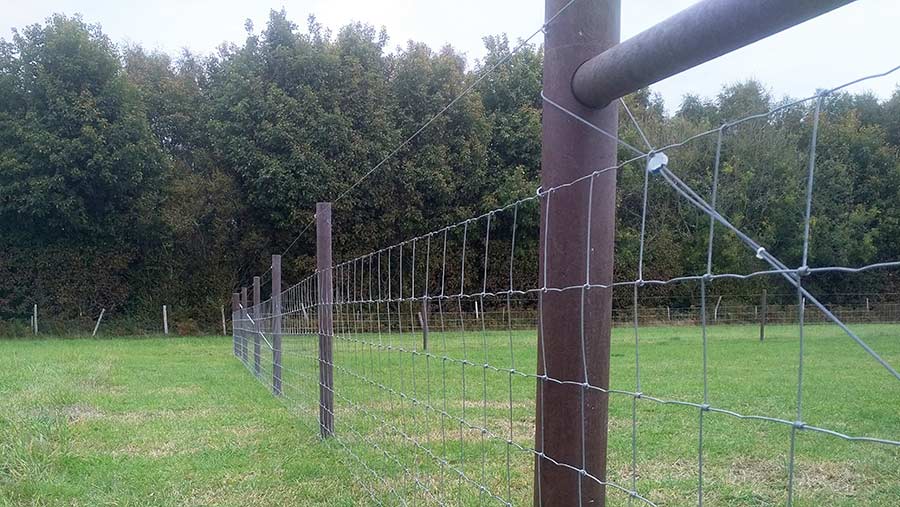
© Hahn Plastics Hanit
These are sold by a number of suppliers in the UK, including Zedlock and Kedel, and they come in a range of sizes.
They behave in a similar fashion to wood, meaning they can be knocked in with a post driver.
However, it’s recommended that a rock spike be driven in first, particularly in hard ground.
Metal reinforced posts are also available for areas that are under a lot of tension.
The posts can be cut to size without any additional treatment and staples and nails can be hammered in by hand.
Guideline prices
- 70×1,750mm pointed rounds: £6.96 in grey, £7.55 in brown.
- 80×1,500mm pointed rounds: £7.74 in grey, £8.40 in brown
- 80×1,750mm pointed rounds: £9.10 in grey, £9.82 in brown
- 150×2,250mm pointed rounds: £41.03 in grey, £44.26 in brown
- Guarantee: 20 years with expected lifespan of 50 years
*Prices from Zedlock

